Heritage under attack: Ukrainians revive interest in culture
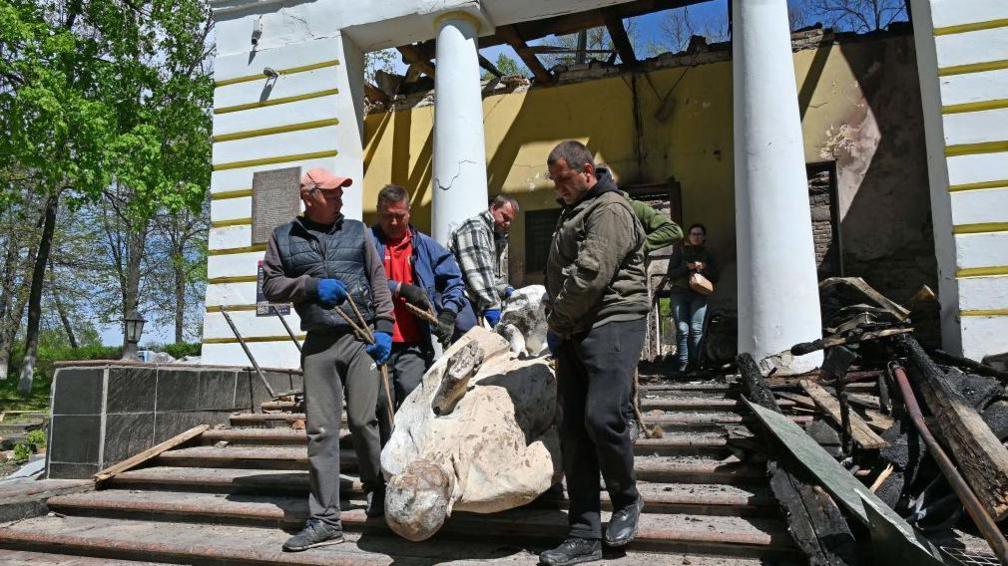
Workers salvage a sculpture of Hryhoriy Skovoroda from his destroyed museum
- Published
It was late at night on 7 May 2022 when a Russian missile hit a museum that was once home to Ukraine’s 18th-Century poet and philosopher Hryhory Skovoroda.
"The roof was completely blown off, the walls are burnt and only Skovoroda's statue survived. It's a miracle that it did," says Nastya Ishchenko, deputy director of the museum in the Kharkiv region of north-eastern Ukraine.
It is one of 432 cultural sites damaged in Ukraine since the start of the full-scale invasion on 24 February 2022, according to the UN’s cultural organisation Unesco.
The destruction of so much of their culture has not just pushed Ukrainians farther away from the Russian-dominated cultural space they shared for decades under Soviet rule.
It has also awakened a hunger for their own culture, described by one daily newspaper as a “Ukrainian cultural boom”.
In total, 139 religious sites have been hit, 214 buildings of historical or artistic interest, 31 museums, 32 monuments, 15 libraries and one archive.
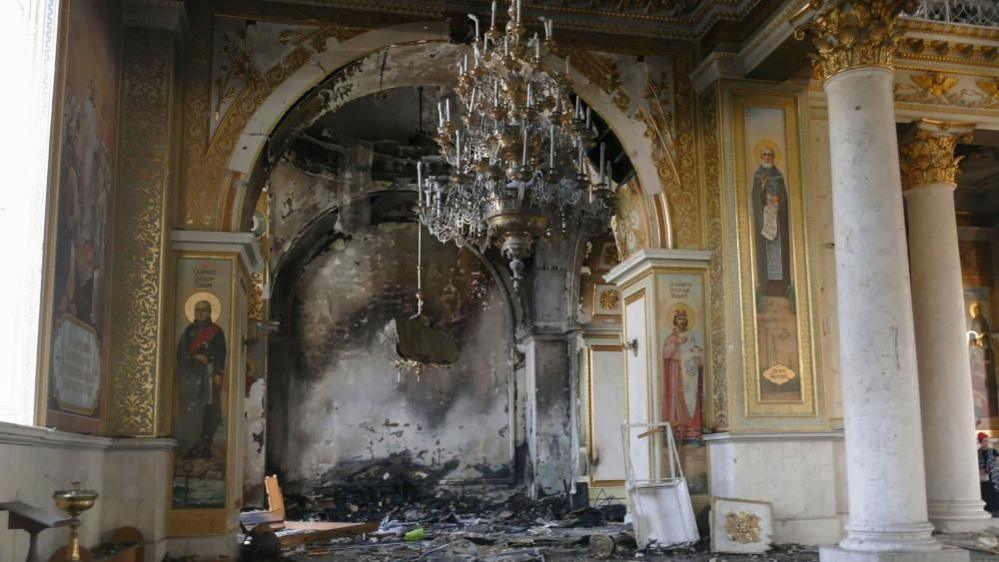
Odesa's Transfiguration Cathedral was damaged by a Russian missile attack last year
The management at the Hryhoriy Skovoroda Museum knew it might come under attack and most of its valuable artefacts had been evacuated to a safer location.
There was nothing military about the museum or its surroundings.
Ukraine’s museums in areas occupied by Russia have faced a very different problem. The full extent of plunder by Russian troops came to light in the final days of the occupation of the southern city of Kherson.
Entire truckloads of artworks and historical artefacts were removed by Russians - ostensibly, for "safekeeping".
The Kherson Art Museum says it has identified 120 artworks taken to Crimea - another occupied area of Ukraine. But the total number of artefacts the museum has lost is more than 10,000.
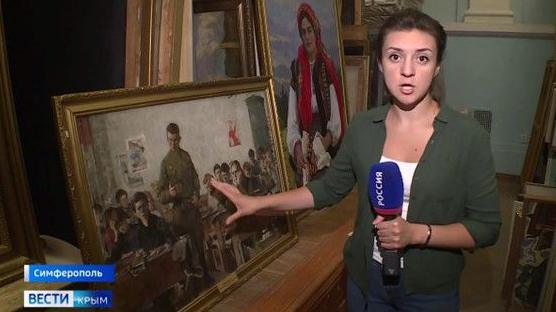
A Russian state TV reporter shows off some of the paintings taken from the Kherson Art Museum
In some museums in occupied parts of Ukraine, Russians removed exhibits for propaganda purposes. For example, an exhibition on Ukraine's modern history in Berdyansk has been replaced with one glorifying the "special military operation" - the Kremlin's official name for the war against Ukraine.
Last May, another aspect of modern Ukrainian culture came under attack with the destruction of the Faktor Druk printing house in Kharkiv, used by almost all Ukrainian book publishers.
Not every cultural building has been hit on purpose, although the attack on Faktor Druk, which killed seven people and destroyed 50,000 books, was widely seen as a targeted strike.
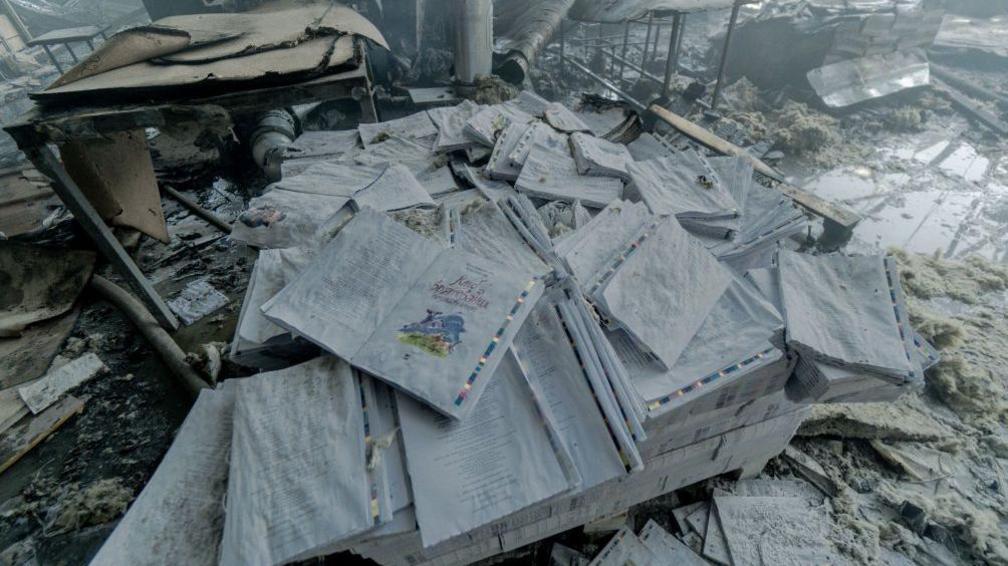
Amid the dead and injured at Faktor Druk were 50,000 destroyed books
Other buildings have been hit because of their proximity to other buildings or to make them unusable for Ukrainian officials or troops.
One publisher described the destruction of books at Faktor Druk as leading to a decline in morale in society. And the disappearance of numerous cultural sites in Ukraine has placed its very social fabric under strain.
They are vital for the cohesion and resilience of communities at a time of war, says the head of Unesco's desk in Ukraine, Chiara Dezzi Bardeschi.
"What I've seen is communities really asking for culture and their cultural centres. They recognise its importance for the community and they need it for their resilience. Culture is very important for healing trauma," she tells the BBC.
Ukraine's power plants at the mercy of Russian missiles
- Published15 April 2024
‘I never worked for the Russians’ - punished by Kyiv for being a collaborator
- Published22 August 2024
The New Wagner Mercenary Group?
- Attribution
Ukraine's acting culture minister, Rostyslav Karandeyev, believes that Russia is deliberately targeting the country’s spiritual and historical symbols: “Not just military targets and critical infrastructure, but also anything that allows Ukrainians to speak of their own identity and statehood.”
As part of this policy, Russian forces have been removing and destroying Ukrainian books from schools and libraries in occupied areas, he told the BBC.
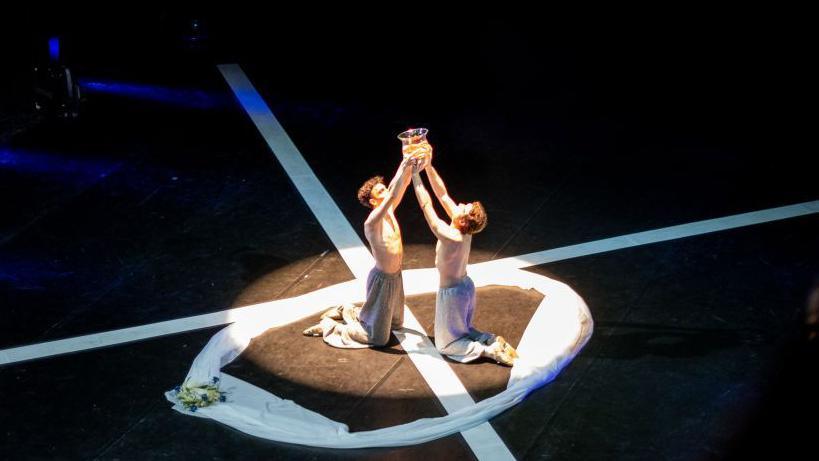
A ballet performance in Lviv dedicated to Ukrainian philosopher Hryhoriy Skovoroda
But amid all the gloom, Nastya Ishchenko from the Skovoroda museum believes Ukrainians have also started to value more what is under threat from the Russian invasion.
"It's like in a relationship: to understand what you've lost, it has to be taken away," she says. "We're uniting not around aggression or anger, but around cultural values which each of us will hand down to future generations. It gives us a ray of light."
Den newspaper describes how bands, performers and writes are appearing, with new plays premiered and theatres full.
Ukraine’s numerous volunteers have not just provided vital provisions and supplies of clothing and medicines, but musical instruments too.
"Children said that music helped them emotionally, it took them to a place where they don't hear bombs or sirens. It helps them enormously," UK-based musician Irina Gould told the BBC's podcast Ukrainecast.
"For them it's the best medicine, just to get away from reality and live in a world of beauty and happiness."